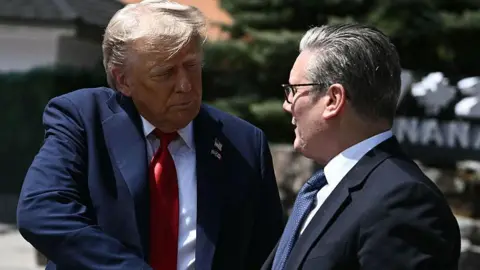Business reporter
A deal removing some trade barriers between the UK and US has been signed off by President Donald Trump.
The move will bring into force parts of an agreement agreed between the two countries last month, and reduce tariffs on UK cars being shipped to the US.
It comes after weeks of talks to implement parts of the pact, which the UK government hopes will shield British businesses from the impact of Trump’s tariffs.
But the deal includes a 10% levy on most UK goods, including cars, and did not address the expected removal of charges on steel imports.
Speaking at the G7 summit in Canada, Prime Minister Sir Keir Starmer called the move a “very important day” for both countries.
The pact, initially agreed last month, is the first the White House has announced since it imposed wide-ranging tariffs on various goods entering America earlier this year.
Trump has raised taxes on goods entering the US, in a series of rapid-fire announcements in an attempt to encourage businesses and consumers to buy more American-made goods.
It sparked financial turmoil and alarm around the world, including in the UK, where car manufacturers and steelmakers rely on the US as a key destination for exports.
Car tariffs
In the order Trump signed on Monday, the US said it would allow up to 100,000 cars into the US at a 10% tariff, instead of the 25% import tax imposed on all car imports earlier this year, as agreed under the terms outlined in May.
The order said the US would set up a similar system for steel and aluminium, but did not specify what it would be.
“We’re gonna let you have that information in little while,” the US President said when asked if steel tariffs would be axed for the UK – a major part of the original tariff pact.
The UK government said it would “continue to go further and make progress towards 0% tariffs on core steel products as agreed”.
The US tax on UK imports of steel and aluminium is currently 25%.
Earlier this month, Britain was temporarily spared when Trump announced a doubling of steel tariffs to 50%.
But the tax could increase for the UK if the government is not able to agree a deal with the US by 9 July.
Under current rules, in order to qualify for an exemption, steel has to be “melted and poured” in the country from which it is imported.
Last year, Tata Steel shut down its blast furnaces and, while it transitions to using an electric furnace, it has been importing steel from overseas.
“Obviously we’ve still got some more work to do,” Transport Secretary Heidi Alexander told the BBC.
“We’re working through some technical detail around steel, because we want to bring that 25% tariff that applies at the moment obviously down further.”
Monday’s order agreed to remove tariffs on certain kinds of aerospace products.
Sir Keir said the deal “implements on car tariffs and aerospace”, and described the agreement as a “sign of strength” between Britain and America.
In response to a question about future tariffs, Trump said the UK was “very well protected”. “You know why? Because I like them,” he added.
The deal on US-UK tariffs will come into effect seven days following its official publication.
Mike Hawes, chief executive of the Society of Motor Manufacturers and Traders, which represents UK carmakers, said it was “a huge reassurance” to the sector.
He told the BBC’s Today programme there had been “a lot less” exports of British cars to the US as the industry waited for the deal to be ratified.
On Monday, JLR, the UK carmaker owned by India’s Tata Motors, lowered its earnings forecast after pausing shipments to the US in April due to tariffs.
Mr Hawes said: “UK exports to the US were never a threat to US production. Last year, we only exported 100,000 – these are small volume, high value manufactured goods, so not the type that are made in the US.”
Car shipments to the US already incurred a 2.5% tariff which meant that if an agreement had not been reached, UK exports would have been taxed at 27.5% when they reached the States.
Mr Hawes said that the 10% tariff “does give some of the UK manufacturers something of a competitive edge because their competitors tend to come from Italy or some from Germany which are still subject to the 27.5% tariff”.
 Getty Images
Getty ImagesBusiness and Trade Secretary Jonathan Reynolds said: “We will update parliament on the implementation of quotas on US beef and ethanol, part of our commitment to the US under this deal.”
US beef exports to the UK have historically been subject to a 20% tariff within a quota of 1,000 tonnes. The UK had agreed to scrap this tariff and raise the quota to 13,000 tonnes, according to terms shared last month.
But the UK government has insisted there will be no weakening of food standards and that any US beef imports will need to meet food safety requirements.
Not a free-trade deal
Ministers have hailed the US deal alongside trade deals with the European Union and India.
But the US agreement is much more limited than the full-fat trade deal that has long been discussed on Downing Street. The scope of what was signed on Monday also appeared more restricted than the general terms of the deal as outlined last month.
Trump has previously declared the pact on tariffs is a “major trade deal”, but it is not. The US president does not have the authority to sign free-trade agreements without the approval of Congress.
The pact has drawn criticism by opposition parties in the UK. Conservative party leader Kemi Badenoch has called it a “tiny tariff deal”.